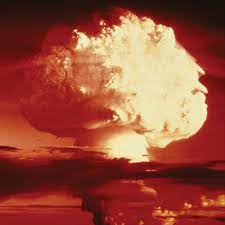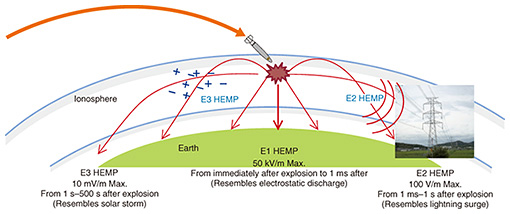

The Terrifying Consequences of a Full-Scale Russia-US Nuclear Conflict
Introduction:
In this report, we explore the unimaginable aftermath of a hypothetical full-scale nuclear war between Russia and the United States. Drawing from non-classified data, we provide a glimpse into the catastrophic consequences that would ensue from such a devastating conflict.
Immediate Strikes and EMP Attacks

Explanation: Within minutes of detecting incoming missiles, both nations would launch their nuclear weapons. High-altitude electromagnetic pulse (EMP) attacks would be the initial strikes, causing widespread damage to electronics and power grids. These EMPs generate pulses of tens of thousands of volts per meter, rendering critical infrastructure inoperable.
Targeted Attacks and Impact
Explanation: Following the EMP attacks, strategic targets such as command and control centers and nuclear launch facilities would become prime targets. Submarine-launched ballistic missiles would rain down on each other’s territories, with land-based intercontinental ballistic missiles following shortly after. Major cities, which hold military installations and are essential for post-war recovery, would bear the brunt of these attacks.
Devastating Effects
Explanation: The impact of the nuclear strikes would be cataclysmic. Each explosion would generate a fireball as hot as the sun’s core, instantly vaporizing individuals in close proximity. Fires and blindness would occur in surrounding areas, while the resulting blast waves would demolish buildings, causing widespread destruction. Additionally, as per NATO’s obligations, Russia would target the United Kingdom and France, exacerbating the devastation.
Firestorms and Nuclear Winter
Explanation: Firestorms would engulf numerous cities, with storm-level winds fanning the flames and igniting anything combustible. Glass would melt, metals would liquefy, and asphalt would turn into flammable hot liquid. However, the most alarming consequence would be the onset of nuclear winter. The black carbon smoke from the firestorms, combined with the immense power of modern hydrogen bombs, would lead to a global cooling effect.
The Catastrophic Impact
Explanation: The suspended black smoke would remain in the atmosphere for up to a decade, propelled by high-altitude jet streams. This phenomenon would trigger a rapid and significant drop in global temperatures. Even during summer months, farmland in regions like Kansas would experience a temperature reduction of approximately 20 degrees Celsius or 40 degrees Fahrenheit. Recent scientific estimates suggest that over 5 billion people, including 99% of the populations in the United States, Europe, Russia, and China, could perish from starvation.
No Winners, Only Losers
Explanation: The grim reality of a Russia-US nuclear conflict is that there would be no winners—only losers. While the exact number of survivors remains uncertain, the potential devastation is dire enough to serve as a strong deterrent. Raising awareness about the horrors of nuclear war is paramount, as knowledge and understanding can help prevent such a catastrophic event.
Conclusion
The consequences of a full-scale nuclear war between Russia and the United States are unfathomable. The immediate strikes, EMP attacks, targeted destruction, firestorms, and subsequent nuclear winter would result in a global catastrophe of unprecedented proportions. It is imperative to acknowledge the immense danger posed by nuclear war and take collective action to prevent it. By widely sharing this information, we can increase awareness and work towards a future where the threat of nuclear conflict is diminished.






Your point of view caught my eye and was very interesting. Thanks. I have a question for you.